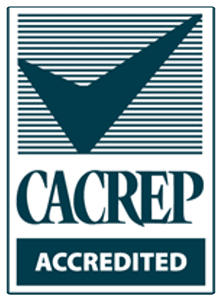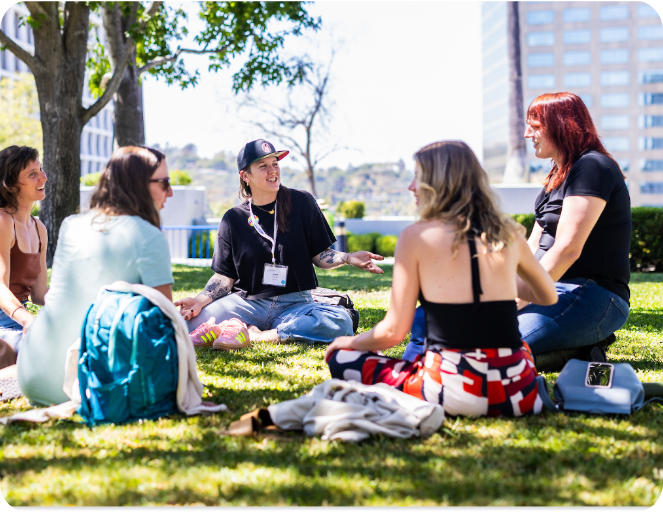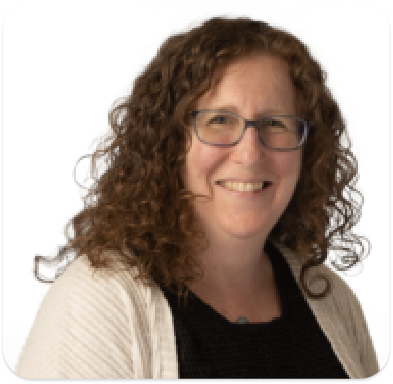Compassionate, Holistic Counseling for Those Suffering
Do you want to put your compassion to work facilitating the healing journeys of others?
To learn to do this effectively, we offer a training program that aligns with national training standards for the master’s in counseling program.
 Saybrook’s hybrid online M.A. in Counseling program is accredited by the Council for Accreditation of Counseling and Related Educational Programs (CACREP). CACREP accreditation ensures that the content and quality of our program have been evaluated and meet standards set by the profession. As a graduate from our CACREP-accredited online clinical mental health counseling programs, you will be equipped with the skills and knowledge for competent practice.
Saybrook’s hybrid online M.A. in Counseling program is accredited by the Council for Accreditation of Counseling and Related Educational Programs (CACREP). CACREP accreditation ensures that the content and quality of our program have been evaluated and meet standards set by the profession. As a graduate from our CACREP-accredited online clinical mental health counseling programs, you will be equipped with the skills and knowledge for competent practice.
Through a hybrid-online learning format that includes 700 hours of field experience, our clinical mental health counseling master's program will prepare you for career opportunities in the broad field of clinical mental health counseling. Guided by faculty with years of experience in the field, you can complete the M.A. in Counseling program without relocating. In this low-residency program, you will become part of a cohort, interacting online and meeting at the beginning of each semester while attending Residential Learning Experiences.
The Counseling Department has adopted a set of professional and personal qualities all students and faculty are expected to demonstrate. These qualities are directly linked to the mission and core values of Saybrook University and inform the related program objectives. The Master's in Counseling program learning outcomes were born directly out of the department’s core values. All members of the counseling community are expected to embody these qualities inside and outside of courses to the greatest extent possible. Upon completion of the counseling programs, students will demonstrate the associated learning outcomes.
Learn more about our M.A. in Counseling program outcomes by reviewing our Student Handbook or Annual Assessment Reports:
- 2024-2025 Annual Assessment Report
- 2023-2024 Annual Assessment Report
- 2022-2023 Annual Assessment Report
- 2021-2022 Annual Assessment Report
As a graduate from this counseling program, you will have satisfied course requirements to apply for licensure as a Licensed Professional Counselor (LPC), Licensed Professional Clinical Counselor (LPCC), or Licensed Mental Health Counselor (LMHC). Different states have different licensing requirements, and we will work with you from the very beginning to help you qualify for licensure in the state where you wish to practice. Learn more about the program’s alignment with state professional licensure requirements.
Annual Program Related Student Outcomes
The Counseling Department is pleased to share the following student outcomes, to both meet ongoing CACREP requirements and to share the success of our graduates. 2024-2025 (summer 2024, fall 2024, spring 2025)
- 100% of graduates who took the exam in this window passed the exam on the first attempt (3 out of 3) *as reported by NBCC
- 0% of graduates did not pass the exam on first attempt *as reported by NBCC
Number of graduates:
- 32 students graduated during the 2024-2025 academic year, representing a 90% completion rate.
Job Placement Rates: This data is based on a 42% response rate to the survey. Six out of 14 students responded to the most recent survey (summer 2022). Data will be collected again in fall 2025.
- 82% are employed within the mental health field
- 16% are currently seeking a position
Other Counseling Programs
Interested in advancing toward a counseling doctoral program? We offer an additional counseling program that may align more closely with your goals.
Clinical Mental Health Counseling Specialization Job Outcomes
Upon graduation, you will have the skill set to work in a variety of roles in private practice, nonprofit service centers, substance recovery centers, community health centers, and beyond, including:
- Mental health counselor
- Counseling program coordinator
- Crisis intervention counselor
- School counselor
- Substance abuse counselor
- Rehabilitation counselor
Program Components
Admissions Requirements
Applicants for the M.A. in Counseling: Clinical Mental Health Counseling Specialization degree must submit the following documents:
- Application for admissions
- An official transcript from an accredited university demonstrating successful completion of a bachelor’s degree, with a 3.0 GPA or better
- Professional resume or CV
- Personal statement
- One letter of recommendation from a professional reference
Invest in Your Future
Saybrook University remains committed to keeping higher education affordable and accessible. Our Financial Aid Department is ready to offer guidance and support in determining suitable financial assistance tailored to your needs, including potential scholarship opportunities, grants, and more.
Cost
Saybrook wants you to have the information you need to make an informed decision about your academic and career aspirations. Our cost calculator provides an estimated cost of attending Saybrook to earn your M.A. in Counseling: Clinical Mental Health Counseling Specialization degree.
FAQs
What are common clinical mental health counseling careers?
Saybrook’s M.A. in Counseling qualifies graduates to pursue licensure to join careers as Licensed Professional Counselor (LPC), Licensed Professional Clinical Counselor (LPCC), or Licensed Mental Health Counselor (LMHC). With those career paths, graduates have many different options for types of employers and settings they can pursue.
What is the job outlook for counseling professionals?
The U.S. Bureau of Labor Statistics projects that the job openings will grow by 19% by 2033 for substance abuse, behavioral disorder, and mental health counselors.
How much do counselors make?
According to the U.S. Bureau of Labor Statistics, clinical and counseling psychologists made an average of $106,600 annually in 2023.
Sample Courses
Basic Counseling Skills
This three-credit course develops foundational clinical skills for professional work with individuals, couples, families, and groups. The course integrates humanistic theories and techniques with an emphasis on self-exploration toward cultivating the professional development of the counselor and psychotherapist. The course introduces foundations in clinical theory including stages of therapy, diagnostic assessment, and therapeutic intervention.
Cultural Humility and Responsiveness
This three-credit course explores psychological approaches in social constructs and emphasizes the following factors in individual and family development: language, acculturation, economics, race, class, gender, sexual orientation, sociopolitical factors, child-rearing practices, family structure, religious traditions, cultural values, and attitudes. The course focuses on clinical issues of cultural competence in the context of ethics, laws, and regulations that define cultural awareness in counseling and psychotherapy.
Internship 1
This three-credit internship is designed to provide students with a model for approaching crisis and critical issues in clinical work, while also providing an arena in which to compare and contrast field placement experiences with other students. Internship 1 focuses on professional development important in issues of cultural and spiritual diversity. Students develop case formulations to recognize issues in assessment, evaluation, and diagnosis, and review treatment models, interventions, and therapeutic outcomes.
Catalog
Please refer to our academic catalog for more information on the M.A. in Counseling: Clinical Mental Health Counseling Specialization program.
Career Outcomes
Saybrook University’s Master’s Degree in Counseling prepares you to make an impact in a variety of high-demand clinical mental health counseling careers. Below, you will find possible career options and salaries associated with the M.A. in Counseling: Clinical Mental Health Counseling Specialization program.
Data is pulled by a third-party tool called Lightcast, which includes data from sources including the U.S. Bureau of Labor Statistics, the U.S. Census Bureau, online job postings, and other government databases. The information below represents a regional and national career outlook related to this counseling master’s program*. Saybrook University is dedicated to assisting you in achieving your career goals.
*Many degree programs are intended to fulfill licensure requirements in specific states. The data shown here may not represent the state where you currently reside. For more information on how this program is applicable to the requirements of your state, please speak with your admissions specialist.
University Learning Experience
Our M.A. in Counseling, Clinical Mental Health Counseling Specialization program is a hybrid online program. Coursework is completed online and augmented with two five-day, in-person Residential Learning Experiences (RLE) per year. RLEs occur at the beginning of the Fall and Spring semesters in California. Every odd-numbered year, the RLE takes place during a larger Community Learning Experience (CLE), encouraging interaction with the larger Saybrook community. In this program, you will begin your studies with a virtual Welcome Week. Welcome Week activities, including a program orientation, are held online during the week before the start of fall and spring semesters.

Counseling Faculty
Saybrook’s Counseling faculty are practitioner-scholars dedicated to advancing their field through continued practice and comprehensive instruction. Meet some of our faculty members below.

- Program Director, Saybrook University
- Former Master’s and Doctorate Professor, Minnesota State University
- Active Member, American Counseling Association and Association for Counselor Education and Supervision
UNBOUND: Counseling
Empower individuals to overcome challenges, achieve personal growth, prevent mental health crises through interventions, and contribute to healthier communities through essential counseling work.


A Guide to Hospice Care Jobs

A Look Into Thanatology: How Professionals Help Individuals Cope With Death, Dying, and Grief
Ready to Take the Next Step?
Submit an inquiry and one of our admissions specialists will connect with you to answer your questions and guide you through next steps.
























